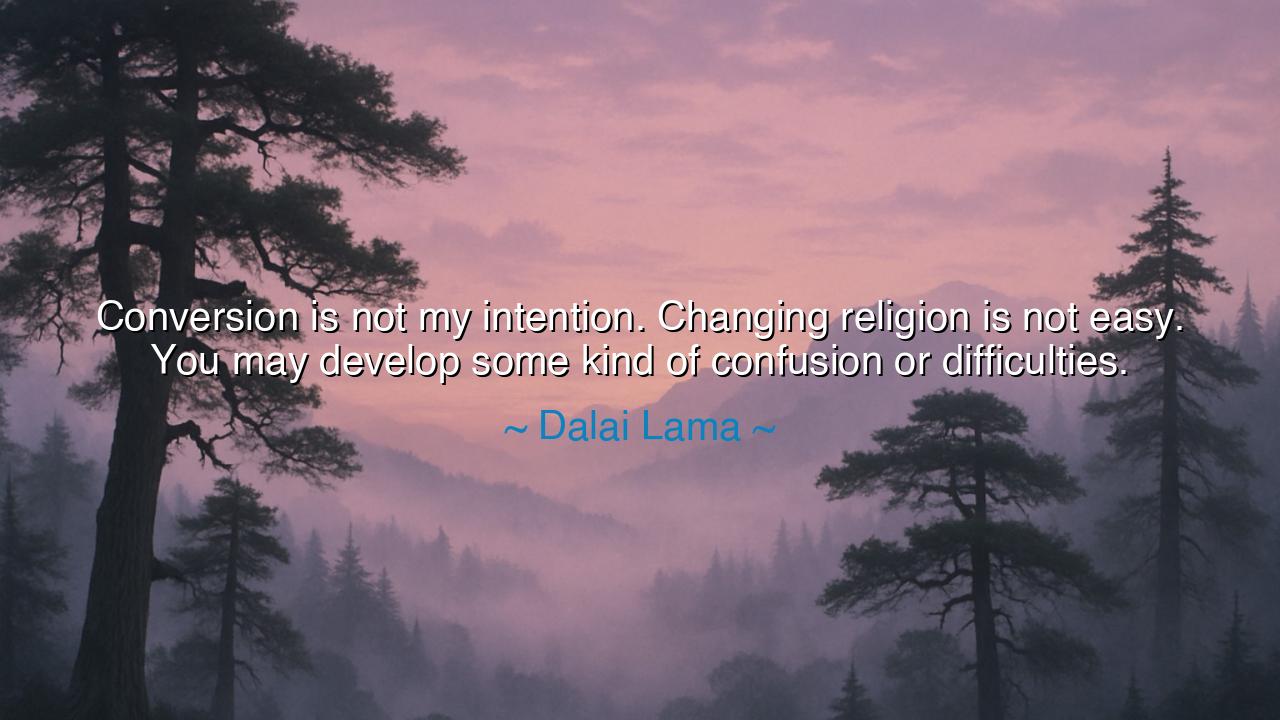
Conversion is not my intention. Changing religion is not easy.
Conversion is not my intention. Changing religion is not easy. You may develop some kind of confusion or difficulties.






"Conversion is not my intention. Changing religion is not easy. You may develop some kind of confusion or difficulties." These words from the Dalai Lama carry with them a wisdom born of deep reflection and experience. In this statement, the Dalai Lama is not merely speaking about religious conversion in the formal sense, but about the journey of faith itself. Religion is not something to be taken lightly or changed at whim, for it is woven into the very fabric of one's identity and life. To change one's religion is not simply a matter of switching beliefs or practices; it is a profound transformation of the spirit, and such a change can bring with it great confusion and difficulties. The Dalai Lama's words remind us that faith is deeply personal, and its roots are not easily uprooted.
In the ancient traditions, religion was not just a set of rituals or beliefs, but a way of life, a guiding force that shaped every aspect of existence. The Hebrews, for instance, saw their faith not as a personal choice, but as the covenant between their people and God. To change one’s faith was not only to abandon a set of beliefs, but to turn away from an entire cultural and spiritual inheritance. This deep connection between faith and identity has remained consistent across all civilizations. The Greeks, too, did not merely worship the gods; they believed that their very moral framework was bound to the divine. Changing one's beliefs was seen as a profound disruption—a dangerous break from the sacred order of the universe.
The Dalai Lama, as a spiritual leader of the Tibetan Buddhists, is acutely aware of how deeply religion shapes the soul. In the Buddhist tradition, faith is not just a belief in a deity or a set of doctrines, but a commitment to a path of enlightenment. For the Tibetan people, their faith has been intricately tied to their identity, culture, and understanding of the world. To ask someone to change their religion is to ask them to reconsider their very relationship with the universe—to uproot their deepest convictions. Such a change is not easy; it can lead to a loss of direction, a sense of alienation, and profound confusion. It is why the Dalai Lama cautions against conversion in the sense of a superficial shift in religious practice. True change in faith, if it is to be meaningful, requires profound reflection and careful understanding.
Consider the story of Siddhartha Gautama, the Buddha. His own journey was one of seeking and searching for truth, but it was not an easy path. After leaving his royal life, Siddhartha embarked on a spiritual quest that involved periods of intense austerity, meditation, and reflection. He did not simply convert to a new religion; he transformed his understanding of life, suffering, and the nature of existence. His awakening was the result of years of inner struggle and discovery. This transformation did not come from following a different set of rituals, but from a radical shift in how he saw the world and himself. Conversion, in the true sense, is not simply about adopting a new set of beliefs—it is about undergoing a profound personal change that affects one's very soul.
In modern times, we often see people shifting between religious or spiritual practices, sometimes in search of meaning or in response to external circumstances. While such changes may seem tempting in a world filled with diverse faiths and practices, the Dalai Lama reminds us of the complexity of such decisions. Faith is a source of stability, a compass that guides one through the storms of life. To change this compass without full understanding can lead to confusion, not enlightenment. Like the story of Siddhartha, true spiritual transformation takes time, patience, and deep reflection. It is not a matter of mere choice, but of profound growth—a growth that cannot be rushed.
The lesson that the Dalai Lama imparts is this: religion, or faith, is not something to be entered into lightly or changed easily. It requires a deep commitment and understanding. Conversion—whether to a new religion or to a new way of thinking—is not merely a change of outward practice but a transformation of the soul. It is something that should come only after profound reflection and inner growth. In a world that often encourages quick fixes and superficial answers, we must remember that true faith requires patience, commitment, and the willingness to endure difficulty and confusion on the path toward deeper understanding.
Thus, the Dalai Lama teaches us to approach matters of faith with caution and reverence. It is not about following the latest trend or converting to the most convenient path. It is about understanding our own hearts and souls, recognizing that true spiritual growth comes from deep, internal work, not external change. Let us take time to reflect on our own spiritual journeys, carefully considering our beliefs and practices, and allowing our faith to grow organically, rooted in truth and understanding. Conversion, if it is to happen, should come from a place of deep awareness, not impulse—a transformation that is lasting and meaningful.






AAdministratorAdministrator
Welcome, honored guests. Please leave a comment, we will respond soon